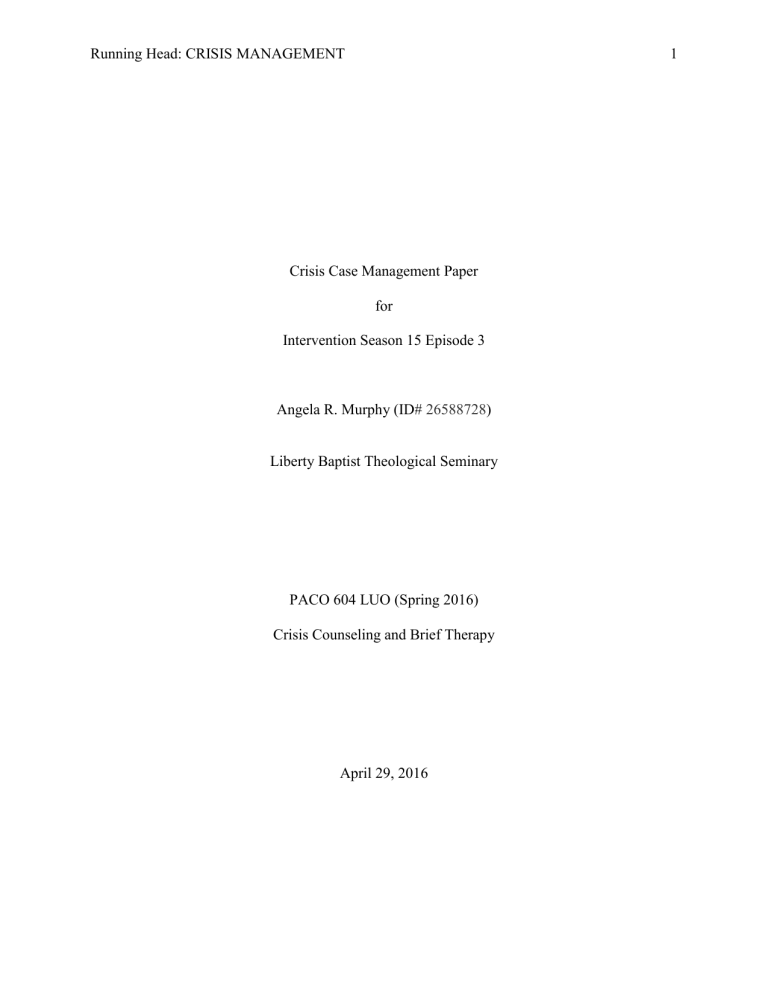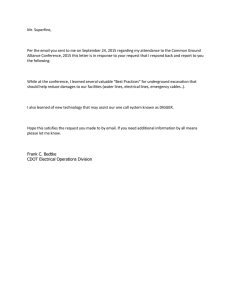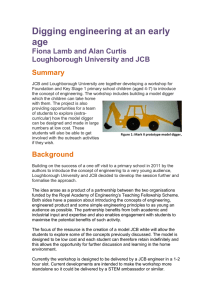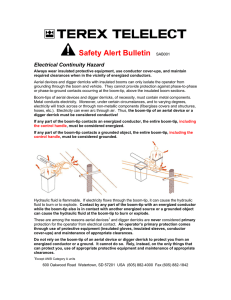
Running Head: CRISIS MANAGEMENT 1 Crisis Case Management Paper for Intervention Season 15 Episode 3 Angela R. Murphy (ID# 26588728) Liberty Baptist Theological Seminary PACO 604 LUO (Spring 2016) Crisis Counseling and Brief Therapy April 29, 2016 CRISIS MANAGEMENT 2 This crisis management paper is in response to an episode of “Intervention”. Intervention is a show that airs on Arts & Entertainment (A&E) and has 15 seasons worth of episodes. The episode used for this paper is titled “Anne & Digger” and originally aired on March 27, 2016. The paper will address the nature of the crisis, alleviating the crises, coping skills and resiliency. The paper will focus on 34-year-old Digger who is currently suffering from heroin addiction. Nature of the Crises According to James and Gilliland (Liberty, 2016) there are five types of crisis. Digger’s initial crisis event was developmental in nature when as a young child is parents divorced. At that point, Digger began dealing with his losses through the use and abuse of alcohol and drugs. This behavior was modeled for him by both his parents and was his only coping skill for dealing with emotions associated with trauma. Digger is sexually assaulted beginning at the age of 10. When he can’t verbalize his fear and pain to his alcoholic father he begins to mimic the father’s behavior and finds a pseudo relief. At the point of his intervention, he is in the midst of an existential crisis. His core belief and value system indicates that his children should be his first priority but that his “day is driven by heroin.” When Digger is sober he can articulate his desire to put his children first in his life and be there for them. He is even able to communicate with them about the desire to be a family again since his mother has custody of the children. However, the heroin has a hold on his life that is impossible for him to break without assistance. Additionally, Digger faces interpersonal crisis with his wife. Digger believes in his marriage and professes to love his wife despite her having left him for another man. Digger maintains that his love is pure despite the dysfunction of the relationship that occurs as they both continue to be drug-seeking first in everything. CRISIS MANAGEMENT 3 Alleviating the Crisis In order for Digger to alleviate his crisis he will need to address his addiction first. Specifically, this will require a period of “drying out” his system. While Digger is desiring a relationship with his children, he must first deal with his presenting issue of medicating his emotions. In order to be successful in removing the physical addiction he will require an inpatient facility that specializes in addiction recovery. Clearing the brain to be able to think will be paramount for Digger to begin to deal with his crisis regarding his children. Additionally, if Digger is able to achieve sobriety he will avert the potential crisis of his death at his own hand. When faced with trying to alleviate the crisis on his own, Digger is not capable of removing himself from his toxic environment. His entire support system is filled with current and former addicts. His father, wife and best friend make up his social support network. They are all in their own states of crisis and unable to assist Digger with resolving his own. According to Wright, crisis generally has to correct itself to a state of non-crisis within six weeks (Wright, 2012, pg. 132). This is not try with the author’s experience of addicts. Crisis becomes their normal and they are not able to see that they live in a state of constant crisis. Removal from the toxic environment is the only way to awaken Digger’s own brain to the reality that he is in crisis currently, and a treatment facility will allow him to recognize his true situation. Coping Skills Addicts have a tough road to recovery. The people who successfully stay sober have to develop a whole new set of coping skills. Specifically, for Digger he has to learn how to handle feeling a normal range of human emotion. Like a child, Digger must learn to correctly identify the emotion he is feeling, the cause of this emotion and how to respond in a healthy way. For CRISIS MANAGEMENT 4 example, when he feels anger at his wife for being unfaithful, he will need to be able to think through this emotional experience and prepare a response. Learning to identify the emotions and causes can happen in a variety of ways. Digger may find that fine art like drawing, writing in a journal or music allows him to verbalize to himself the emotion and then determine his response. As he grows in his ability to identify the emotion, the art may be his response. Additionally, Digger will need coping skills for quite some time to help him deal with his psychological addiction to heroin. Many addicts turn to healthier pursuits, like running, martial arts, weightlifting, to work through cravings and idle time which can lead to relapse. Former methamphetamine and alcohol addict Tom Murphy commented that “if I could run till I dropped then I could sleep and generally when I woke up the craving is gone.” (Murphy, 2016). Additionally, Digger will need to learn to find non-toxic relationships. Learning the signs of addictive behavior and his personal triggers to return to addiction will help him to determine who might be a good asset in his social circle and who to avoid. Having someone to call to talk you through a craving or moment of weakness is a necessity for many addicts in recovery. When addicts try to do it alone most often they fail and developing a social system to support them in a key coping skill. Resiliency In the episode, Digger suffers a relapse which is not an uncommon situation on the road to recovery. Digger makes large strides toward resiliency when he is able to self-identify that he needs to return to a treatment center to start again. For Digger, this ability to start fresh each day will be critical to his long term recovery. His initial crisis was compounded by his inability to voice the loss, grieve and heal. If he is to develop long term success in life, he will need to be CRISIS MANAGEMENT 5 able to let go of the day to day hurts and problems of life and not hold them until they compound to his need to isolate and medicate himself from his emotions. With addiction, life has to be lived one moment at a time during the initial re-training period. Sobriety is earned in hours, then days, then weeks, months and years. Digger will learn to be more resilient in life if he continues to measure success in smaller increments. Daily successes can build to weekly and monthly victories. But starting with goals of monthly victories or yearly goals is sometimes overwhelming to the newly recovered addict. Building resiliency will be a product of doing it right every time. For former addict Tom Murphy, it was a process of only changing one thing in his life, everything. When everything has to change in order to survive, the addict must be able to see victory in the tiniest of actions. Each tiny win builds on the other and leads to long term resiliency. Digger is well on his way by being able to identify his failures as well. There will be times when he falls down but being able to pick himself back up and not stay down is key to being successful in the end. CRISIS MANAGEMENT 6 References Field, P (Writer) & Burney, T. (Director). (2016) Anne & Digger [Television series episode]. Banz, G. R., Brandon, M, Weaver, J.L. (Executive Producers), Intervention Los Angeles, CA. A&E. Liberty University (2016). Introduction to Crisis Counseling. Received from https://learn.liberty.edu/bbcswebdav/pid-11960265-dt-content-rid95243655_1/courses/PACO604_D03_201620/PACO604_Presentations/Introduction%20 to%20Crisis%20Counseling%20%28LMS%29/res/index.html Murphy, T. April, 27, 2016. Face to face interview. Wright, D. H. (2014). The Complete Guide to Crisis & Trauma Counseling: What to do and Say When it matters Most. Bloomington, Minnesota: Bethany House Publishers. CRISIS MANAGEMENT 7 CRISIS CASE MANAGEMENT PAPER GRADING RUBRIC Name: Angela Murphy Points Possible Criteria General Paper adheres to APA formatting (title page, citations, references page, etc.) 10 Writing is clear with appropriate grammar, spelling, and punctuation Headings are appropriately labeled 10 Nature of the Crisis (300 words) Identifies the nature of the crisis for the family member 10 Distinguishes the type of crisis (i.e. developmental, situational, existential, interpersonal, spiritual) 10 Alleviating the Crisis (300 words) Delineates an appropriate model of crisis care 10 Appropriate strategies are considered for alleviating the crisis 10 Teaching Coping Skills (300 words) Offers teachable coping skills for the client to learn from the crisis 20 Developing Resiliency (300 words) Provides specific approaches toward developing resiliency 20 Total Instructor’s comments: 100 Points Earned




